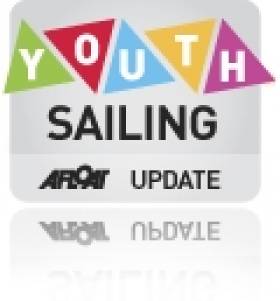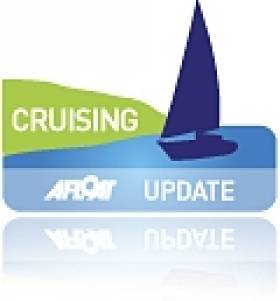Displaying items by tag: Yachtmaster
Youngster Becomes One of the 'Youngest Ever' Professional Yacht Masters, Aged Just 18
#youthsailing – A young Cumbrian lad is celebrating after becoming one of the youngest ever professional yacht masters, at the tender age of 18. Former Windermere School pupil, Dominic Jackson, has passed the 'professional yacht master offshore course', delivered by the North West Sports Centre on the island of Cumbrae, in Scotland. Dominic, who is described by his family as a 'natural sailor', started learning the ropes aged 10, at the International School in Qatar.
Registered disabled, having been born with only one hand, Dominic successfully completed the gruelling 18 week course, along with two other students, sailing throughout the night and until 3am up the East Coast of the Isle of Bute, with only skill and calculation to guide him; no technical assistance was permitted. Now qualified to skipper his own yacht, Dominic looks set for a future on the waves.
"We are all immensely proud of Dominic and delighted for him that he can start building a future in the field that he loves." said his father, Chris Jackson, who runs cottage letting agency, Heart of the Lakes, with his parents, Peter and Sue. "He has worked extremely hard and his qualification is an extraordinary achievement, particularly for someone so young."
"To pass this course aged 18 is very unusual. There are not many who can do it." said Cumbrae's Professional Yacht Master Instructor, Rod Smith. "The course is very intense and involves all aspects of learning, from skippering a boat, to the theoretical elements, such as navigation and meteorological testing. Dominic was an exceptional candidate and we applaud him on his achievement. Passing this aged 18, is pretty much as young as you can get!"
New Yachtmaster Course Launched by Galway Sailing School
#YACHTMASTER – In the wake of their recent Careers At Sea Expo, Galway sailing school Bow Waves are rolling out a full time Commercial Skipper course. Many people at the Careers At Sea Expo were interested in the pathways to careers, particularly the 200gt Commercial Skipper course. The course is unique in Ireland claim Bow Waves. It offers candidates the opportunity to gain a 200gt Commercial Skipper ticket in both sail and power. The dual certification gives students the chance to seek employment in a range marine jobs including, offshore support for the energy industry, superyacht skippering, bareboat charter, and commercial enterprise.
The course is open to people of all ability, including those who have no previous boating experience. The course is run in a module format which includes introductory courses to sailing and powerboating and follows through to Yachtmaster Offshore, with the option to qualify in Yachtmaster Ocean. The course also covers full STCW 95 safety training which is carried out in house at the centre in Galway. The course also allows for mile building in both sail and power to allow students to gain relevant experience in both areas.
In addition to a high level of training, the course also includes career guidance, with the Bow Waves team providing assistance in finding and applying for jobs.
The course is due to start on the 30th of January, and will run for 16 weeks. The course is fully credited by the MCA, ISA, RYA and Department of Transport. For full course details, as well as pricing, contact Barry on 091 560 560, or e-mail [email protected].
Cruising School No Longer Operating in Irish Waters
South East Cruising School is no longer operating in Irish waters and in a letter to Afloat magazine, Principal Charlie Kavanagh, outlined his reasons for closure. The letter is reproduced below. The Marine Survey Office (MSO) was offered a right of reply but to date we have had no response.
Sir,
Having operated my business, South East Cruising School, under the auspices of the Irish Sailing Association for the last 14 years, I am very sorry to say that due to adverse circumstances, I now find that I can no longer operate in Irish waters.
In that time, I have assisted well over a 1,000 sailors to learn about our sport and improve their skills in a safe environment. I would like to take this opportunity to say thanks to each and every one for their custom and friendship over the years.
I recently submitted my boat for inspection under the Commercial Sail Passenger Boat Regulations and the Marine Survey Office (MSO) conducted an initial survey last May, which has completely stalled over a number of issues. As it is my opinion that these matters will not be resolved amicably, I have no choice but to suspend things for now and look at other options.
For those of you not familiar with the process, the Department of Transport's MSO has drawn up a set of Regulations that, in my opinion, do not help to promote safer sail training.
They have refused point blank to consider adopting the UK's MCA Code of Practice, administered by the RYA, the world leaders in most matters relating to sail training and from whom I hold my Yachtmaster Instructor qualification.
Five years ago, we had close to 15 schools offering cruiser sail training, but this is now down to five or six, and it's unlikely any more will get through this process without severe cost to themselves and the security of their boat(s).
Also, to the best of my knowledge, we have no powerboat school for those wishing to learn big boat power handling. Not content with banishing Asgard II to remain in her watery grave, cruiser sail training in Ireland is fast being sunk by the State too, as it reduces the number of outlets that teach safe practices to the general public wishing to go to sea in our island nation.
In 1997, I set out to operate my school under the watchful eye of Paddy Boyd of the ISA and subsequently Tony Wright, both of whom worked hard to aid and supervise us under the ISA Cruising Scheme. My thanks go to them and all in the ISA for their help over the years. It is with a heavy heart that I have to let go of my dream, having suffered the highs and lows over the years, but 2010 has been a nightmare, thanks to the MSO.
As an Irish taxpayer and committed community person, I - like many others in the commercial marine community - am disgusted at the State's attitude towards sailing and the sea.
Yours in Sailing,
Charlie Kavanagh,
ISA/RYA Yachtmaster Instructor






























































